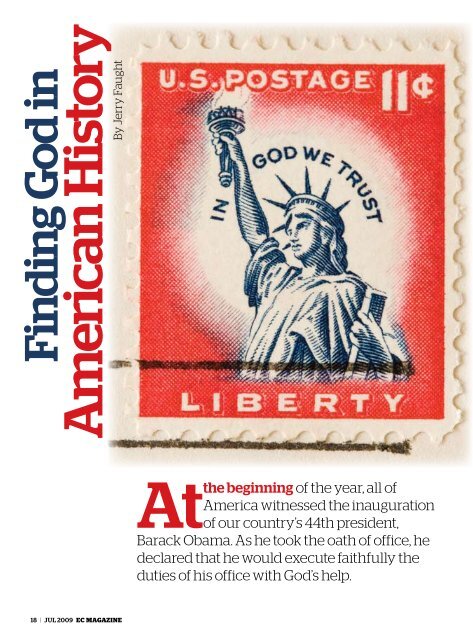test pdf
test description
test description
Create successful ePaper yourself
Turn your PDF publications into a flip-book with our unique Google optimized e-Paper software.
Finding God in<br />
American History<br />
By Jerry Faught<br />
At of our country’s 44th president,<br />
the beginning of the year, all of<br />
America witnessed the inauguration<br />
Barack Obama. As he took the oath of office, he<br />
declared that he would execute faithfully the<br />
duties of his office with God’s help.<br />
© istockphoto / john kropewnicki<br />
The last phrase of the oath—“so help me God”—reminded<br />
me of my trip to New York City just a few weeks earlier. I had<br />
traveled by bus to Ground Zero to see the work being done on<br />
the new World Trade Center. I then walked across the street<br />
to visit St. Paul’s Chapel. St. Paul’s, built in 1766, miraculously<br />
survived the collapse of the twin towers on September 11,<br />
2001. For eight months after the tragedy, this church served<br />
as a place for volunteer relief workers to eat and rest. Inside<br />
the chapel, I saw pictures of many who died in the terrorist<br />
attack. A feeling of deep sadness came over me as I looked at<br />
the pictures and other memorabilia.<br />
That’s when I saw a sign indicating that George<br />
Washington, our nation’s first president, had been inaugurated<br />
in St. Paul’s in 1789. I walked over to a bench called<br />
Washington’s Pew where he knelt to pray during his inaugural<br />
service. As I exited the church, I surmised that the pew<br />
and the chapel itself stood as a monument of hope in a confusing<br />
and chaotic world.<br />
That experience reminded me that God shows up in a big<br />
way throughout the history of our nation. Let’s discover a<br />
few of the significant ways that our nation has expressed its<br />
dependence upon God.<br />
Religious freedom doesn’t mean no religion<br />
Virtually all the men involved in the founding of our nation<br />
believed in God. Although some were Deists who believed that<br />
God did not intervene directly in the world, most of the founding<br />
fathers were Pro<strong>test</strong>ant Christians. These leaders realized,<br />
however, that making Christianity or any other religion the<br />
official or established religion of the nation would not be<br />
healthy for religion or the<br />
state. That is why Congress<br />
passed the First Amendment<br />
to the Constitution which<br />
prohibits the government<br />
from establishing or favoring<br />
any religion and protects the<br />
free exercise of religion in<br />
our land.<br />
Although we Americans<br />
have prized religious freedom,<br />
this has not prevented<br />
us from making public<br />
statements about our reliance<br />
upon God. Take out a<br />
coin from your pocket or<br />
purse, and you will see the<br />
motto “In God We Trust.”<br />
These words were placed on<br />
United States coins<br />
America’s religious freedom<br />
has not prevented us from<br />
making public statements<br />
about our reliance upon God.<br />
during the terrible days of the Civil War. Religious fervor<br />
among Americans had increased during the crisis of war.<br />
Secretary of the Treasury Salmon P. Chase received many<br />
appeals from pious persons throughout the country urging<br />
the government to honor God on United States coins.<br />
Congress passed an act on April 22, 1864 that allowed “In<br />
God We Trust” to first appear on the 1864 two-cent coin. The<br />
phrase later appeared on other coins.<br />
The phrase “In God We Trust” does not only appear on<br />
coins. In 1956 President Eisenhower approved a law passed<br />
by Congress declaring “In God We Trust” to be our national<br />
motto. A year later the phrase was found on paper money<br />
for the first time when it appeared on the one-dollar silver<br />
certificate.<br />
Another famous American phrase mentioning God comes<br />
from the pledge of allegiance and is recited daily by millions<br />
of schoolchildren around the country. The pledge was originally<br />
written in 1892 by a Baptist minister named Francis<br />
Bellamy (1855-1931). In 1953, the Roman Catholic fraternal<br />
service organization, the Knights of Columbus, mounted a<br />
campaign to add the words “under God” to the Pledge. At the<br />
© istockphoto / lee pettet<br />
18 | jul 2009 ec magazine ec magazine jul 2009 | 19


